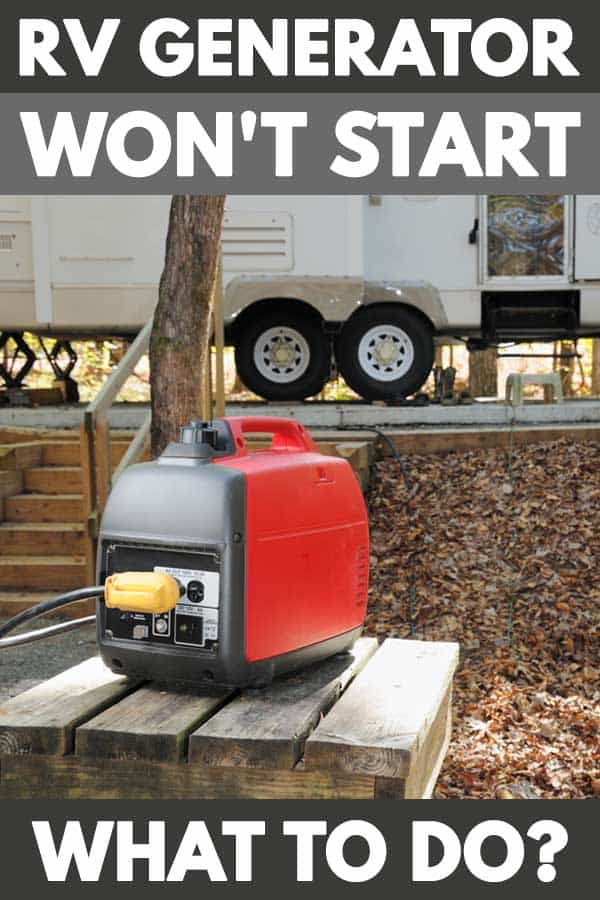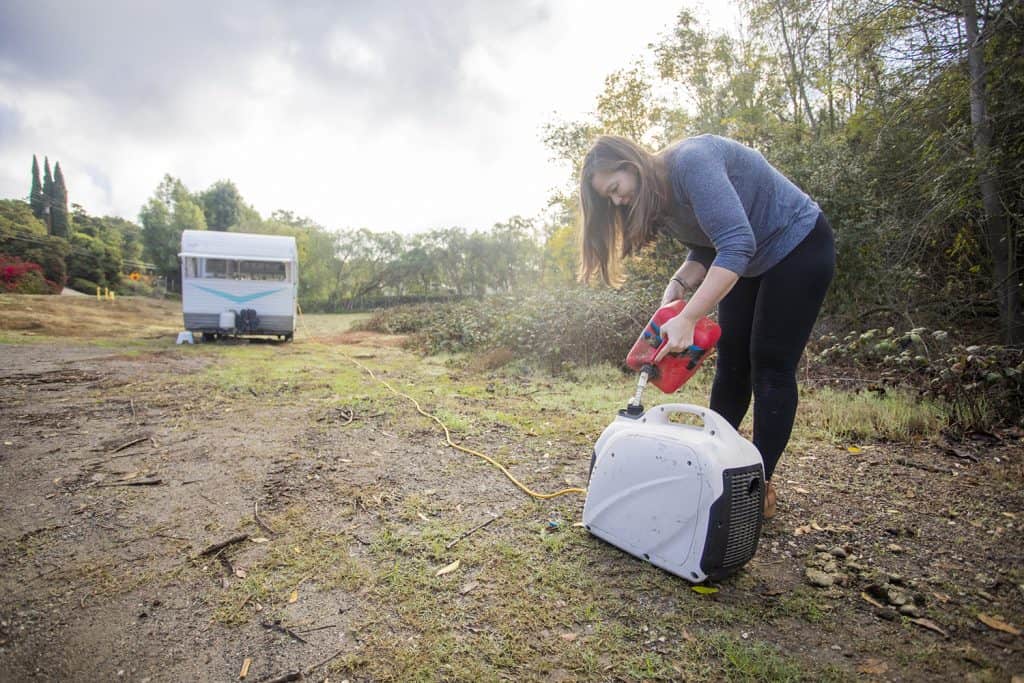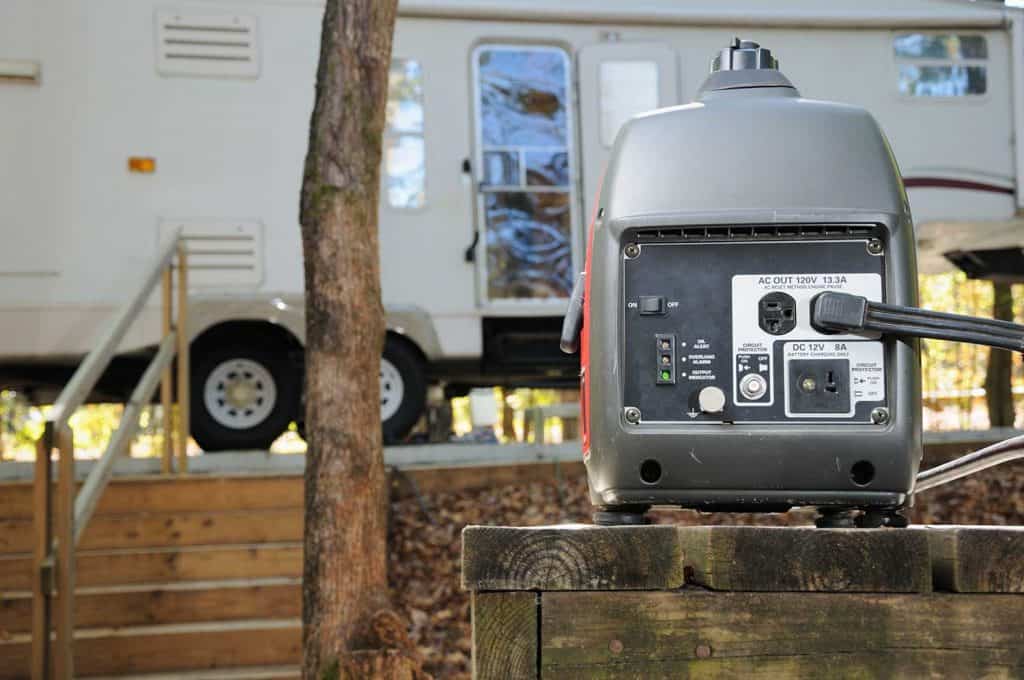 Your RV’s generator is the device that provides electricity to your rig's major appliances when you're boondocking and parked off-the-grid. So when you’ve pulled over and settled in for the night and the generator won’t start, the situation can be very frustrating. Fortunately, the fix could be a simple one.
Your RV’s generator is the device that provides electricity to your rig's major appliances when you're boondocking and parked off-the-grid. So when you’ve pulled over and settled in for the night and the generator won’t start, the situation can be very frustrating. Fortunately, the fix could be a simple one.
Understanding that your generator works much like a car in that it requires fuel, oil, and routine maintenance to run properly.
- There isn't enough fuel in your RV
- Not enough fule - or old fuel - in the generator
- The oil level is low
- There's no spark to ignite the generator due to battery issues
- Something else broke down
For the most part, the first three issues can probably be fixed by you. However, there are different kinds of generators and knowing which kind and where its fuel source is will help you to understand why the generator won’t start, how to solve the problem and how to avoid it from happening again.
Let's take a look at the common issues which you can probably handle by yourself.
Who Can Help When A Generator Won't Start
If you're totally unfamiliar with generators and don't feel comfortable handling them, look for help. There are many types of RV generators that run on different types of fuel and have slightly different setups. It also matters if your genny is built-in or an external standalone unit. By that, we mean to say that the instructions offered in this post may vary slightly, according to your specific kind of generator.
This is where knowing your specific model, and/or having a bit of experience, come in handy. Your first ally is the manufacturer's manual. When buying any kind of generator (or a motorhome with built-in generator), you'll find a small booklet enclosed with instructions on how to operate your specific model. That guide should also have a troubleshooting section. It's always a good idea to check there first. If you can't find the manual, look for an online copy, by searching for the specific model.
Most manufacturers also offer help via phone or online. You may consider using that as well.
Next, if you're staying in a campground, ask your fellow RV'ers for help. RV'ers are a friendly lot and you may come across someone who knows generators quite well and will have the time to help you out, or at least offer some support.
Two things to remember though -
- Stay safe. This is an appliance capable of generating an electric shock so treat it with respect.
- Don't do anything that may void your warranty.
Time to go over the common malfunctions that can result in your generator failing to start.
Problem: Not enough fuel in the RV
Your RV’s generator runs on either gas, diesel or propane. Built-in generators usually utilize diesel or gasoline and are connected to the main fuel tank, as opposed to having its own fuel tank.
Many modern RVs have a run-out-of-fuel prevention hack to keep you from completely depleting your fuel source when running the generator overnight. The hose to the generator from the main fuel tank could be higher up from the bottom of the tank so that you will need more than a quarter tank of gas for it to run the generator.
If your fuel tank goes under the one-quarter mark, no gas will be going out to the generator and it won't start. If you’re parked on uneven ground, you might need even more than a quarter tank as this would throw off the level.
Note that in this situation, the generator may still crank, taking juice from the battery, but it won't start without fuel. Don't drain your battery by trying to start it too often without fixing the issue at hand.
Solution: Put more fuel in the tank.
This is as simple as getting more gas or diesel fuel, depending on which fuel source your RV and its generator take, which is likely the same if the generator is built into the RV and they share a fuel tank.

Problem: Not enough fuel, or old fuel, in a standalone generator
With a standalone unit, you'll need to make sure it has enough fuel. If the generator hasn't been used in a long while, the fuel may have become stale.
Solution: Add fuel, or replace it.
Know the type of fuel your generator takes and make sure you use the right one: Propane, diesel or gasoline. Using the wrong kind of fuel can destroy your generator. If there is stale fuel in the device, you may need to take the generator to a service center to get it cleaned up and get the fuel filter replaced, before adding more fuel.
Problem: The oil level is too low
Like your car and the RV, the generator requires oil to lubricate the mechanical system that makes it work. If your oil is too dirty or too low, the system won’t work properly and may not start at all. Just like with a car, you should have an oil fill lid in your generator, with an internal dip stick. Take it out, clean it gently with a clean cloth and dip it in again. Then take it out to check oil levels.
Solution: Replace the oil
Generators run on standard motor fuel oil, though you will need to check your RV’s manual for the specific type of oil that’s recommended. You can top up the oil yourself, or take your RV to a mechanic to change the oil if it's too dirty.
Problem: There are issues with the house battery
Because the built-in generator requires voltage from the main house or coach battery to start, issues with the battery itself could be the culprit for why your generator won’t start. Has the battery been fully charged? Are the connections from the battery to the generator clean and tight?
Solution: Check the house battery and its connections.
Make sure your main battery is in good shape, holds a charge and has been sufficiently charged. Check to see that all the connectors are clean, no corrosion or leakage is present, and they fit snuggly to the battery. If your battery is old or corroded, it may be time for a new house battery, in which case there will be other indicators aside from the generator not starting.
When something else breaks down
Everything mechanical has an expiration date, and even generators that have been well-maintained will only run for so many hours. If you have an older generator or one that’s been well-used, it may be time to replace parts of the generator or even the entire unit. Some items can be relatively easy to replace if you're technically inclined. Common parts that need replacing after a while include the air filter, the fuel filter, and spark plug.
You probably want to consult a certified technician before making this call yourself, but once it’s confirmed that your generator has simply worn itself out, you can start shopping for a new one.
A Good General Maintenance Routine is Key

There are many parts to a generator and things like rubber hoses, spark plugs if it runs on gas, coolant, oil, and anti-freeze that need replenishing, and fuel filters that can get worn out, clogged, cracked or dirty, could eventually cause the generator to run poorly or not start at all.
Generators range in size and power depending on the size of the RV, so you will need to check your manual for recommended routine maintenance times. It’s also a good idea to keep records of when things have been checked, oil and fuel filters replaced, and the like. You can read more in our article: RV Generator Maintenance Guide for Beginners.
While most generator start issues can be avoided with a good maintenance routine, it’s comforting to know there are a few things that could be the cause that is easy to fix. Hopefully, your generator not starting is due to one of the easy fixes mentioned above. Good luck!
Suggested Reading
It's always a good idea to know more about your RV and its parts. We suggest these articles for more information about generators -
Types Of RV Generators (And Which One Is Right For You)
Can I run the RV generator while driving?
7 Top RV Generator Brands You Need To Know About
Where to Buy an RV Generator? 30 Online Stores Reviewed
